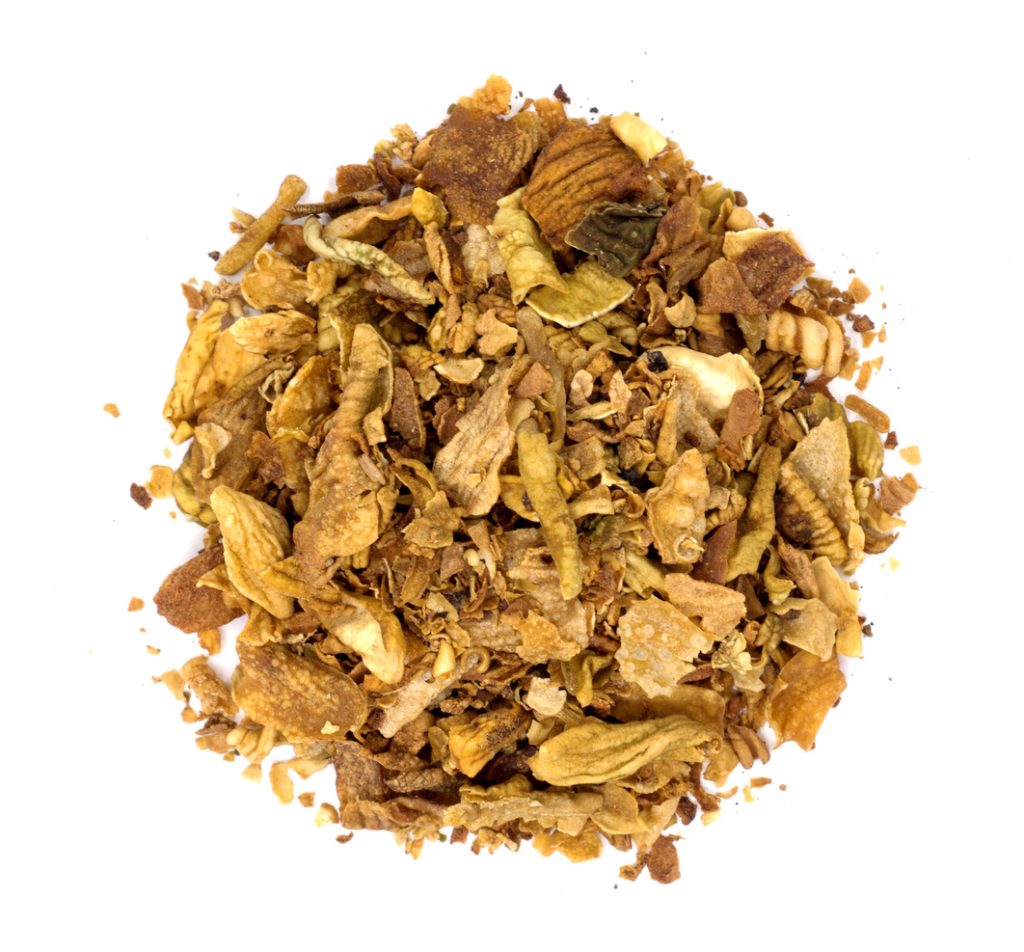Chicken Gizzard Skin (Ji Nei Jin)

What is Chicken Gizzard Skin (Ji Nei Jin)?
Chicken Gizzard Skin (ji nei jin, 鸡内金) comes from Chicken Gizzard, a tiny muscle that is part of the chicken’s stomach. This muscle helps the chicken to break down and digest seeds and other foods. All birds, including ducks and turkeys, have a gizzard.
Chicken Gizzard is a popular street food in Haiti and Southeast Asia, where they are grilled. In Indonesia and Japan, Chicken Gizzard is often fried. In Portugal, Chicken Gizzard is found stewed. In Africa, Chicken Gizzard is found broiled. In the United States, especially in the Southern states, Chicken Gizzard is often served with hot sauce.
Chicken Gizzard Skin is the inner lining of Chicken Gizzard, which has a yellowish-gold colour. This is why its Chinese name (ji nei jin) carries the meaning of ‘gold inside the chicken’. This substance has been in use in Traditional Chinese Medicine (TCM) for about 2000 years, as shown by its records in the The Divine Farmer’s Materia Medica (Shen Nong Ben Cao Jing, 神农本草经).
In Traditional Chinese Medicine (TCM), Chicken Gizzard Skin falls under the category of ‘Herbs that relieve Food Stagnation’. Such herbs usually possess digestive properties that promote the movement of food. Some of these herbs are high in digestive enzymes and may help with food digestion.
Neutral in nature, Chicken Gizzard Skin does not affect the yin-yang balance in your body. Sweet in taste, Chicken Gizzard Skin can slow down acute reactions, detoxify the body, and has a tonic effect on the body by replenishing qi and blood. In particular, the herb targets the bladder, the Spleen, the stomach and the small intestines.
Functions and Benefits of Chicken Gizzard Skin (Ji Nei Jin)
Traditional Chinese Medicine (TCM) shows that Chicken Gizzard Skin has the following health benefits.
In the ancient times, Chicken Gizzard Skin was described as a treatment for diarrhoea. Later, it developed a reputation for promoting digestion and astringing fluid discharge, which are therapeutic approaches to treat diarrhea, but can also be used to alleviate other symptoms such as nausea, vomiting and indigestion.
Chicken Gizzard Skin can thus relieve indigestion by treating food stagnation caused by Spleen Deficiency and food accumulation in the digestive tract . The herb can invigorate the Spleen as well to treat infantile malnutrition caused by Spleen Deficiency. To enhance its effectiveness in treating symptoms of Spleen Deficiency, Chicken Gizzard Skin can be combined with other Spleen-invigorating herbs such as Chinese Yam (Shan Yao, 山药).
Chicken Gizzard Skin can arrest seminal emission, premature ejaculation, excess urination and relieve enuresis. To address such problems, Chicken Gizzard Skin can be stir-baked singly, ground into powder for oral use, or combined with other Kidneys-tonifying, semen-securing or enuresis-relieving herbs.
It is said that Chicken Gizzard Skin can be used to alleviate chronic digestive disorders, such as stomach ulcers, stomach burning, atrophic gastritis, acid reflux and stomach prolapse.
In addition, Chicken Gizzard Skin can be used to relieve stranguria, break down lower abdominal masses in women, eliminate urinary stones and gallstones.

How to Use Chicken Gizzard Skin (Ji Nei Jin)
The recommended daily dosage of Chicken Gizzard Skin is 1.5 – 3g, if consumed in powder form. Alternatively, if used to make a decoction, you can use 3 – 10g of Chicken Gizzard Skin.
You can find Chicken Gizzard Skin and Chicken Gizzard Skin products in some herbal stores and Asian markets.
Cautions and Side Effects of Chicken Gizzard Skin (Ji Nei Jin)
Chicken Gizzard Skin should not be used by individuals who are experiencing Spleen deficiency without food stagnation.
We strongly recommend you to consult your healthcare provider before deciding to add Chicken Gizzard Skin to your healthcare routine.
Summary
Here is a summary for Chicken Gizzard Skin (Ji Nei Jin):
- Herb name (Chinese): 鸡内金
- Herb name (Pin Yin): jī nèi jīn
- Herb name (English): Chicken’s Gizzard-skin
- Herb name (Botanical): Endothelium Corneum Gigeriae Galli
- Origin of species: Gallus gallus domesticus Brisson
- Part(s) of herb used: Inner lining of organ (gizzard)
- Geo-specific habitat(s): Most parts of China
- Taste(s) & Properties: Sweet; Neutral; Administrates the Spleen, Stomach, Small Intestine and Bladder Meridians
- Actions: Eases symptoms relating to indigestion, premature ejaculation and difficult urination, and gallstones
References
Borten, P. (2009). Raw herb powders and powdered herb extracts in the treatment of chronic idiopathic pain: a methodology and case study. The Journal of Chinese Medicine, (89), 50.[Accessed on 4th February 2023]
Ni, C. H., Lee, C. S., Chuan, F. Y., Enomoto, H., Takeda, S., Lin, L. C., & Sakata, R. (2018). Investigation of the chemical composition and functional proteins of chicken gizzard inner lining. Food Science and Technology Research, 24(5), 893-901. [Accessed on 4th February 2023]
Ni, C., Takeda, S., Cheng, F., Liu, Y., Lin, L., & Sakata, R. (2019). Protective effects of chicken gizzard inner lining extracts against injury to gastric mucosal cells. Fleischwirtschaft, 99(6), 97-102. [Accessed on 4th February 2023]
Share this article on
